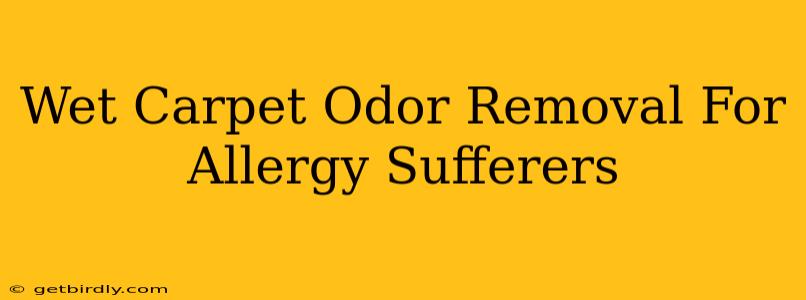Wet Carpet Odor Removal for Allergy Sufferers
Damp carpets are a breeding ground for mold, mildew, and dust mites – all major triggers for allergy sufferers. The resulting musty smell isn't just unpleasant; it's a symptom of a potentially unhealthy environment. For allergy sufferers, dealing with a wet carpet means tackling the odor aggressively and effectively to protect respiratory health. This comprehensive guide outlines strategies for wet carpet odor removal, focusing on the specific needs of allergy sufferers.
Why Wet Carpet Odor Matters to Allergy Sufferers
The lingering smell from a wet carpet isn't just a nuisance; it indicates the growth of microscopic organisms. These organisms release volatile organic compounds (VOCs) that can irritate airways, trigger allergic reactions, and exacerbate existing respiratory conditions like asthma. Mold and mildew spores, in particular, are potent allergens, often causing sneezing, coughing, watery eyes, and skin rashes. Dust mites, thriving in damp environments, release allergens into the air that can trigger similar symptoms.
How to Remove Wet Carpet Odor: A Step-by-Step Guide for Allergy Sufferers
Effective wet carpet odor removal for allergy sufferers requires a multi-pronged approach emphasizing thorough drying, deep cleaning, and ongoing preventative measures.
1. Immediate Actions: Drying the Carpet
The first and most crucial step is to dry the carpet as quickly as possible. This minimizes the time mold and mildew have to establish themselves.
- Ventilation: Open windows and doors to maximize airflow. Use fans to circulate air directly over the wet area. A dehumidifier can significantly speed up the drying process.
- Blot, Don't Rub: Avoid rubbing the carpet, which can spread the water and damage the fibers. Instead, gently blot with clean towels or absorbent cloths.
- Remove Excess Water: Use a wet/dry vacuum to extract as much water as possible from the carpet. This is especially important for deeply saturated areas.
2. Deep Cleaning: Eliminating Allergens and Odors
Once the carpet is dry, a deep clean is essential to remove lingering allergens and eliminate the odor.
- Professional Cleaning: Consider hiring a professional carpet cleaning service, particularly if the carpet is heavily soiled or the area is large. Professional-grade equipment is more effective at removing embedded allergens and moisture. Ensure you specify your allergy concerns when booking the service; they can use specialized products suitable for allergy sufferers.
- DIY Cleaning: For smaller areas, you can attempt DIY cleaning. Use a carpet cleaner specifically designed for allergen removal, and always follow the manufacturer's instructions. Choose a product labeled as hypoallergenic.
- Baking Soda: Sprinkle baking soda liberally over the affected area. Baking soda is a natural deodorizer and absorbent. Let it sit for several hours or overnight, then vacuum thoroughly.
- White Vinegar: Dilute white vinegar with water (equal parts) and apply it to the affected area using a spray bottle. Let it sit for a few minutes, then blot with clean towels and allow it to air dry completely. Vinegar has natural deodorizing and antimicrobial properties. Note: Always test a small, inconspicuous area first to ensure it doesn't damage your carpet.
3. Ongoing Prevention: Maintaining a Healthy Environment
Preventing future wet carpet issues is crucial for allergy sufferers.
- Promptly Address Spills: Clean up spills immediately to prevent moisture from seeping into the carpet fibers.
- Regular Vacuuming: Regular vacuuming removes dust mites, allergens, and other particles that contribute to odors.
- Proper Ventilation: Ensure adequate ventilation in your home to prevent moisture buildup. Use exhaust fans in bathrooms and kitchens.
- Regular Carpet Cleaning: Professional carpet cleaning at least once or twice a year is recommended, especially for allergy sufferers.
- Air Purifier: Using an air purifier with a HEPA filter can help to remove allergens and improve air quality.
Addressing Specific Concerns: FAQs
What are the best cleaning products for allergy sufferers?
Look for carpet cleaning products specifically labeled as "hypoallergenic" or "allergen-free." Many professional cleaning services offer allergy-friendly options as well. Always check the ingredient list to avoid products containing harsh chemicals or fragrances that could trigger allergies.
How can I prevent mold growth in my carpets?
Maintaining proper ventilation and promptly addressing any spills or leaks are crucial. Regular professional cleaning helps remove moisture that promotes mold growth. Consider using dehumidifiers in damp areas.
My carpet still smells after cleaning. What should I do?
If the odor persists, consider professional odor removal services. They may employ specialized techniques and equipment to eliminate stubborn smells. It's also important to investigate the source of the moisture, ensuring there aren't underlying plumbing issues or leaks contributing to the problem.
What if I suspect black mold?
If you suspect black mold, do not attempt to clean it yourself. Black mold can be hazardous to your health, and professional mold remediation is necessary. Contact a qualified mold removal specialist immediately. They will take the necessary steps to safely remove the mold and prevent further growth.
By following these steps and prioritizing preventative measures, allergy sufferers can significantly reduce the impact of wet carpet odors on their health and well-being, creating a cleaner, healthier home environment. Remember to always prioritize safety and seek professional help when needed.

